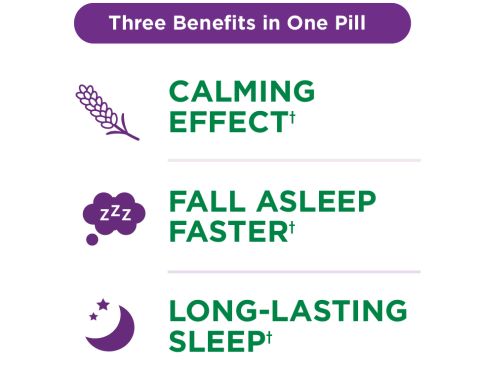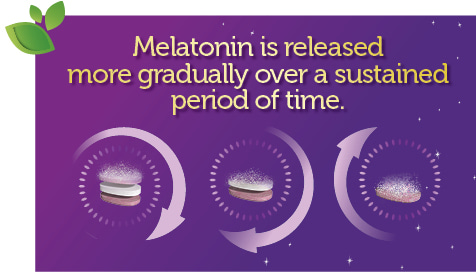Nature's Bounty
Nature's Bounty Sleep3 10mg. Melatonin, 120 Tablets
Nature's Bounty Sleep3 10mg. Melatonin, 120 Tablets
Share
受取状況を読み込めませんでした
Product Details



Nature's Bounty® Sleep 3 is a triple-action, 100% drug-free sleep aid. Each tablet leverages time-release technology to dissolve each layer at different times throughout the night to help you relax and get a good night's sleep so you can wake up ready to take on the day.
• Maximum Strength 100% Drug-Free Sleep Aid
• 3 Benefits In One Pill: Triple-action time-release formula with specialized ingredients to relax and help support restful quality sleep.
• Benefit 1: Calming L-Theanine, combined with a blend of nighttime herbs including chamomile, lavender, lemon balm and valerian root extracts, to help you relax and unwind.
• Benefit 2: Quick-release melatonin helps you fall asleep fast.
• Benefit 3: Time-release melatonin works with your body’s natural sleep cycle to help you stay asleep.
For occasional sleeplessness.

Sleep 3’s Triple-Action Time Release Technology

L-theanine
Quick-release melatonin

Time-release melatonin

Get a good night’s rest with Nature’s Bounty Sleep3.†

Benefit 1: Relax and Unwind
Unable to relax prior to bedtime? The combination of L-theanine with a nighttime herbal blend including chamomile, lavender, lemon balm, and valerian root extracts helps you to relax and unwind.*
Benefit 2: Fall Asleep Faster
Trouble falling asleep at night? Have you ever found yourself staring at the ceiling in bed? Quick-release melatonin may help to reduce the time it takes to fall asleep at bedtime.*
Benefit 3: Long-Lasting Sleep
Waking up in the middle of the night, or too early in the morning? These experiences can result in fragmented or insufficient sleep. Time-release melatonin may help you maintain optimal levels of melatonin in the bloodstream over a sustained period to help you stay asleep.



Are you getting enough sleep?
More than one in three U.S. adults report getting less than the recommended amount of sleep per night. 13 The trouble for some is falling asleep, while for others it’s waking up several times throughout the night, or a combination of both. There are a number of factors that can lead to disrupted sleep or occasional sleeplessness. These include lifestyle habits, night shift work, artificial light, light-emitting devices used at or near bedtime, or jet lag.
Whatever the cause of occasional sleeplessness, the lack of sleep can affect how you feel, how you look, and how well you perform during the day.14 Taking a proactive approach to getting better quality sleep is just as important to your health as diet and exercise.
Far from switching off during sleep, your body remains active working just as hard as when you’re awake to restore your body’s energy levels, to repair muscles and cells, and renew a variety of body systems. 14-15 Sufficient quality sleep helps the brain process information, improves memory recall, and reduces mental fatigue.16
To obtain the full range of benefits of restorative sleep, the average adult should be getting around seven or more hours of quality sleep each night.15 There are a few general tips for achieving better sleep at night. These include being physically active during the day, going to bed at the same time consistently each night (including on the weekends), avoiding the use of light-emitting digital devices before bedtime, avoiding caffeine or large meals before bedtime, and sleeping in a bedroom that is quiet, dark and at a comfortable temperature.17

Why supplement with melatonin before bedtime?
Melatonin is a hormone naturally produced in the body that’s involved in our natural sleep cycle.* As light fades at dusk and early evening, our melatonin levels begin to rise triggering sleepiness. During the early morning as the sun begins to rise, less and less melatonin is made and we start to wake up and be more alert. Peak melatonin levels are reached generally between 2 a.m. and 4 a.m.18-20
The normal release of melatonin is vital for the maintenance of circadian rhythm and your “sleep-wake cycle.” However, melatonin amounts can vary depending on the person.19 As we get older, the amount of melatonin that our bodies produce lessens.18 Its normal release in the brain can also be suppressed by traveling to different time zones, nightshift work, lifestyle habits, and artificial light or light-emitting electronics, such as television or mobile phones. This disruption can affect your ability to relax, ability to fall asleep, or stay asleep throughout the night.
Melatonin is a safe and effective supplement to promote sleep.5-9 Clinical studies have found that taking melatonin at bedtime can help shorten the time it takes to fall asleep, can help promote sleep quality, and help to increase the total amount of time that is spent asleep throughout the night.5-9 The natural hormone helps to support sleep quality by working with the body’s circadian rhythm and helps to - synchronize the “sleep wake” cycle.5-9, 21










